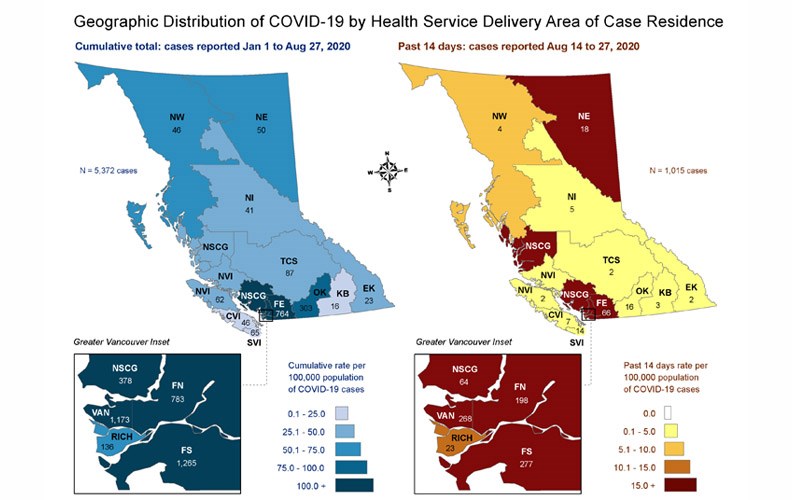There were four new cases of COVID-19 in the Northern Health region reported on Thursday, and the B.C. Centre for Disease Control reported five cases of the disease in the Northern Interior region in the past two weeks.
B.C. provincial health officer Dr. Bonnie Henry said the total number of cases since the start of the pandemic increased to 137. Across B.C., there were 68 new cases, bringing the province's total since the start of the pandemic to 5,372.
Data released by the B.C. Centre for Disease Control on Thursday showed there were 19 active cases in the north – including one patient hospitalized in intensive care.
With the school year approaching, Henry also reported the province has seen eight suspected cases of multisystem inflammatory syndrome in children (MIS-C) – a condition linked to COVID-19 in children. All eight children who developed MIS-C were hospitalized and two required intensive care, but all eight have now recovered, she said.
"This has been associated with COVID-19 in some parts of the world," Henry said. "All eight cases are suspected, because they didn't test positive for COVID and didn't have the antibodies either."
MIS-C is similar to a rare condition called Kawasaki disease, which cause inflammation of the blood vessels throughout the body, Henry said. Symptoms of MIS-C and Kawasaki disease include prolonged fever, red eyes, fatigue or lethargy, upset stomach, swollen hands or feet, red rashes or red, cracked lips.
"We've not seen an increase in Kawasaki syndrome. It is, I must say, a very rare condition," Henry said. "We will continue to monitor it as we head into the school year."
One additional person died of COVID-19, Health Minister Adrian Dix said, bringing the province's death toll from the pandemic to 204. The most recent victim was a long-term care resident in the Fraser Health region.
Throughout B.C. there were 906 active cases of COVID-19, Dix said. Of those, 22 people were hospitalized, including seven in intensive care.
A total of 2,810 British Columbians were under surveillance for possible exposure to the disease.
"As we head into another weekend of this summer we're dealing with the COVID-19 pandemic... our responsibility, our duty, is to stop the spread," Dix said.
MAPS SHOW LOCATION OF CASES
A pair of maps released by the B.C. Centre for Disease Control on Thursday show the breakdown of COVID-19 cases by health service delivery areas and local health areas.
Between Jan. 1 and July 31, there were 33 cases of COVID-19 in the Prince George region – an area which stretches from the Robson Valley in the east, to north of Mackenzie, one map showed.
A second map reported 41 cases in the Northern Interior health service delivery area– which includes Prince George – up to Thursday (Aug. 27). Five of those cases were reported in the last 14 days.
WORK CAMPS LINKED TO CASES
On Wednesday, the District of Kitimat reported there was a confirmed case of COVID-19 at the Sitka Lodge work camp in Kitimat. The 1,186-room camp, operated by Civeo, provides accommodation for workers building the Coastal GasLink natural gas pipeline and LNG export terminal in the town.
"We have confidence that Civeo has appropriate policies and procedures in place to manage this case and to minimize potential further transmission," the District of Kitimat statement said. "In order to minimize the risk of COVID-19 in our community and mitigate any potential impacts, the District of Kitimat has engaged in extensive conversations with the provincial health authorities, Haisla Nation council, industrial partners and work accommodation providers. The District of Kitimat remains supportive of industrial activity in our community during the COVID-19 pandemic, provided industrial proponents and their service partners adhere to appropriate prevention and mitigation protocols and practices."
On Thursday, Henry reported an outbreak of seven cases linked to a work camp in Elkford – a small community in southeast B.C.
"The outbreak was identified after the workers had returned to their homes," Henry said.
Several of the workers were not from B.C., and provincial public health authorities are working with those other jurisdictions to contact anyone who may have been exposed, she said. Because of the rules in place at industrial work camps, the risk of exposure in the community is low, she said.
"These rules are designed to protect the community and the people working in the camp," she said.



